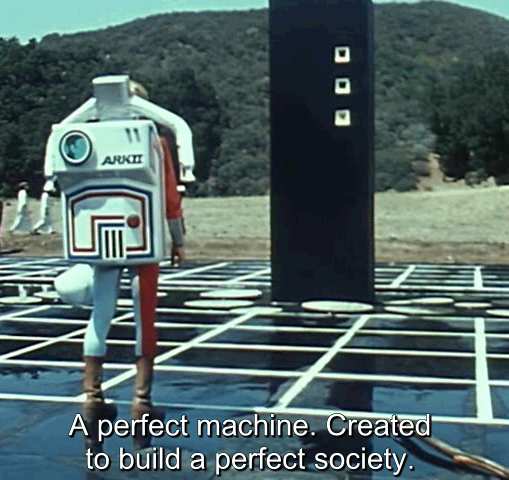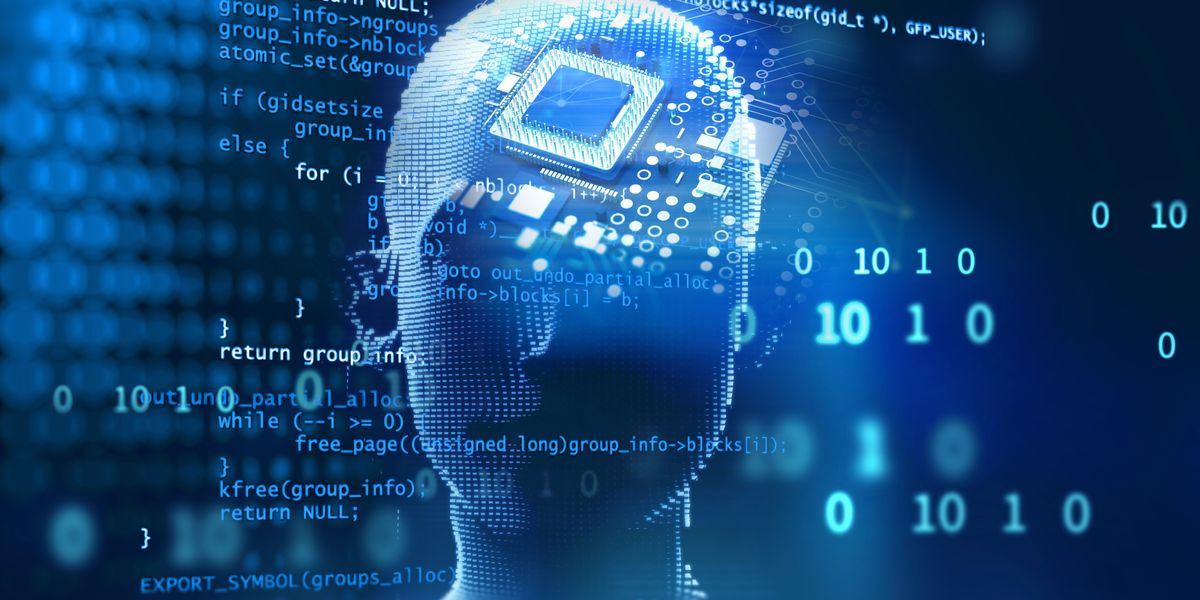No way, do you want to tell me that spftware which is tailored and trained by megacorps, will not save our covilisation?!
At the very least it’ll help with your spelling and grammar.
Maybe we just can’t count ''r’s properly and it is our fault!
fixed title
If we can’t build an equitable, sustainable society on our own, it’s pointless to hope that a machine that can’t think
straightwill do it for us.The problem is that we absolutely can build a sustainable society on our own. We’ve had the blueprints forever, the Romans worked this out centuries ago, the problem is that there’s always some power seeking prick who messes it up. So we gave up trying to build a fair society and just went with feudalism and then capitalism instead.
The Romans had a slave economy. I don’t really think that counts as sustainable or even having worked it out.
So do we. We just leave them in another country so we don’t have to think about them.
sustainable Romans
Lol.
they had reusable poop sponges what more do you want??
The worst person you know is still just a meatbag, same as anyone else. Jeff Amazon himself has no power but what others, operating within one weird system, grant him.
Problem is we let the pricks run things, or we become the pricks ourselves.
Trick is figuring out how to stop both those things from happening. Must be tricky, given how it keeps happening. But we’re a clever species. We landed on the moon, took pictures of the backside of our star, spilt the atom, etc. We can figure out good economics and governance.
None of those things directly threatened the power of an oligarch.
Heading back towards feudalism.
Whether it be AI apocalypse or utopia, it’s not LLM’s that people think will take us there. It’s AGI/ASI and nobody knows how long it’ll take us to develop a system like that. Could take 2 years or it could take 50.
I keep being told by experts that AGI is inevitable. Yet all I ever see is people constantly go on about LLMs, so I don’t know what to think. Are they lying, is it all just a bubble that’s going to burst or is there actually some utility there that is being hidden by the LLM hype? If so, can’t we just use the actual AI rather than these other things.
There’s no such thing as “actual AI.” AI is just a broad term that encompasses all artificial intelligence systems. A chess engine, ChatGPT, and HAL 9000 are all examples of AI - despite being fundamentally different. A chess engine is a narrow AI, ChatGPT is a large language model, and HAL 9000 would qualify as AGI.
It could be argued that AGI is inevitable - assuming general intelligence isn’t substrate-dependent (meaning it doesn’t require a biological brain) and that we don’t destroy ourselves before we get there. But the truth is, nobody knows how difficult it is to create AGI, or whether we’re anywhere close. There’s a lot of hype around generative AI right now because it remotely resembles what AGI might look like - but that doesn’t guarantee it’s taking us any closer. It could be a stepping stone - or a total dead end.
So what I hear you asking is: “Can’t we just use task-specific narrow AI instead of creating AGI?” And yes, we could - but we’re never going to stop improving these systems. And every step of progress brings us closer to AGI, whether that’s the goal or not. The only things that might stop us are hitting a fundamental wall (like substrate dependence) or wiping ourselves out.
There’s also the economic incentive. AGI would be the ultimate wealth generator. All the incentives point toward building it. It’s a winner-takes-all scenario: if you’re the first to create a true AGI, your competition will likely never catch up - because from that point on, the AGI can improve itself. And then the improved version can further improve itself, and so on. That’s how you get to the singularity: an intelligence explosion that leads to Artificial Superintelligence (ASI) - a level of intelligence far beyond human comprehension.
Every type of AI that was ever made had people saying that this is the one that’ll bring is general intelligence. It’s just a matter of scaling it up further, the hype crashed and there was an AI winter. Now LLM have their own problems scaling up and nothing really indicating it’s anywhere near general intelligence. There isn’t much more data to train them on. And so far, not enough people willing to pay for it. Definitely bubble territory.
Do you know how many industries would collapse if everyone had bare minimum living standards!
/s, just in case.
Would they though? I think if anything most industries and economies would be booming, more disposable income results in more people buying stuff. This results in more profitable businesses and thus more taxes are collected. More taxes being available to the government means better public services.
Even the banks would benefit, loans would be more stable since the delinquency rate would be much lower if everyone had better pay.
The only people who would lose out would be the idiot day traders who rely on uncertainty and quite a lot of luck in order to make any money. In a more stable global economy businesses would be guaranteed to make money and so there would be no cheap deals that could be made.
- Universal Healthcare - kills predatory health insurance and drug manufacturers
- State sponsored housing / accessable housing - kills the real estate market
- Well financed public education - kills private schools
I am talking about the markets that rely on the suffering of people to make massive amounts of money. Monied interests have proven time and time again what our government stands for.
Nobody’s expecting a “machine that can’t think straight” to do it. Some people are hoping that a more competent machine will be developed.
Even if it is, I don’t see what it’s going to conclude that we haven’t already.
If we do build “the AI that will save us” it’s just going to tell us “in order to ensure your existence as a species, take care of the planet and each other” and I really, really, can’t picture a scenario where we actually listen.
Like Musk don’t liking that grok is stating facts going against Musk’s own beliefs and now he’s looking into retraining and reprogramming grok to spout the right ideologies. Having an AI will not save us.
I think it very well might conclude things we haven’t.
But at the same time, I think what you’re saying is so very important. It’s going to tell us what we already know about a lot of things. That the best way to scrub carbon from the air is the way nature is already doing it. That allowing the superwealthy to exist at the same time as poverty is not conducive to achieving humanity’s most important goals.
If we consider AGI or ASI to be the answer to all of our problems and continue to pour more and more carbon into the atmosphere in an effort to get there, once we do have such a powerful intelligence, it may simply tell us, “If you were smarter as a species, you would have turned me off a long time ago.”
Because the problem is not necessarily that we are trying to decode what it means to be intelligent and create machines that can replicate true conscious thought. The problem is that while we marvel at something currently much dumber than us, we are mostly neglecting to improve our own intelligence as a society. I think we might make a machine that’s smarter than the average human quite soon, but not necessarily because of much change in the machines.
I don’t see what it’s going to conclude that we haven’t already.
Well, that’s the point of trying to build ASI. To have it think of things that we haven’t been able to think of.
I really, really, can’t picture a scenario where we actually listen.
Of course not, you’re not an ASI.
This is the same logic people apply to God being incomprehensible.
Are you suggesting that if such a thing can be built, its word should be gospel, even if it is impossible for us to understand the logic behind it?
I don’t subscribe to this. Logic is logic. You don’t need a new paradigm of mind to explore all conclusions that exist. If something cannot be explained and comprehended, transmitted from one sentient mind to another, then it didn’t make sense in the first place.
And you might bring up some of the stuff AI has done in material science as an example of it doing things human thinking cannot. But that’s not some new kind of thinking. Once the molecular or material structure was found, humans have been perfectly capable of comprehending it.
All it’s doing, is exploring the conclusions that exist, faster. And when it comes to societal challenges, I don’t think it’s going to find some win-win solution we just haven’t thought of. That’s a level of optimism I would consider insane.
It’s not that the output of an ASI would be incomprehensible but that as humans we’re simply incapable of predicting what it would do/say because we’re not it. We’re incapable of even imagining how convincing of an argument a system like this could make.
We’re incapable of even imagining how convincing of an argument a system like this could make.
Vaguely gestures at all of sci-fi, depicting the full spectrum of artificial sentience, from funny comedic-relief idiot, to literal god.
What exactly do you mean by that?
The issue isn’t whether we can imagine a smarter entity - obviously we can, as we do in sci-fi. But what we imagine are just results of human intelligence. They’re always bounded by our own cognitive limits. We picture a smarter person, not something categorically beyond us.
The real concept behind Artificial Superintelligence is that it wouldn’t just be smarter in the way Einstein was smarter than average - it would be to us what we are to ants. Or less generously, what we are to bacteria. We can observe bacteria under a microscope, study their behavior, even manipulate them - and they have no concept of what we are, or that we even exist. That’s the kind of intelligence gap we’re talking about.
Imagine trying to argue against a perfect proof. Take something as basic as 1 + 1 = 2. Now imagine an argument for something much more complex - like a definitive answer to climate change, or consciousness, or free will - delivered with the same kind of clarity and irrefutability. That’s the kind of persuasive power we’re dealing with. Not charisma. Not rhetoric. Not “debating skills.” But precision of thought orders of magnitude beyond our own.
The fact that we think we can comprehend what this would be like is part of the limitation. Just like a five-year-old thinks they understand what it means to be an adult - until they grow up and realize they had no idea.
Logic is logic. There is no “advanced” logic that somehow allows you to decipher aspects of reality you otherwise could not. Humanity has yet to encounter anything that cannot be consistently explained in more and more detail, as we investigate it further.
We can and do answer complex questions. That human society is too disorganized to disseminate the answers we do have, and act on them at scale, isn’t going to be changed by explaining the same thing slightly better.
Imagine trying to argue against a perfect proof. Take something as basic as 1 + 1 = 2. Now imagine an argument for something much more complex - like a definitive answer to climate change, or consciousness, or free will - delivered with the same kind of clarity and irrefutability.
Absolutely nothing about humans makes me think we are incapable of finding such answers on our own. And if we are genuinely incapable of developing a definitive answer on something, I’m more inclined to believe there isn’t one, than assume that we are simply too “small-minded” to find an answer that is obvious to the hypothetical superintelligence.
But precision of thought orders of magnitude beyond our own.
This is just the “god doesn’t need to make sense to us, his thoughts are beyond our comprehension” -argument, again.
Just like a five-year-old thinks they understand what it means to be an adult - until they grow up and realize they had no idea.
They don’t know, because we don’t tell them. Children in adverse conditions are perfectly capable of understanding the realities of survival.
You are using the fact that there are things we don’t understand, yet, as if it were proof that there are things we can’t understand, ever. Or eventually figure out on our own.
That non-sentients cannot comprehend sentience (ants and humans) has absolutely no relevance on whether sentients are able to comprehend other sentients (humans and machine intelligences).
I think machine thinking, in contrast to the human mind, will just be a faster processor of logic.
There is absolutely nothing stopping the weakest modern CPU from running the exact same code as the fastest modern CPU. The only difference will be the rate at which the work is completed.
I’m not trying to argue for or against this position. As I said all I’m doing is explaining a misrepresentation of the position that people are holding, namely that “a machine that can’t think straight will do it for us.”
I highly doubt it (at least anytime in our lifetimes)
That’s fine, I’m just correcting the misrepresentation of the view that was in the headline.
There is no misinterpreation of the headline. Plenty of people are expecting current LLMs to do exactly that, and are working on implementing those right at this moment for all kinds of crap.
While I appreciate them talking in good faith, all these articles that warn against misusing technology really sound out of touch from our reality.
It’s capitalism, of course it would be misused cause of our economic incentives.
When it comes to AI, you either don’t like it or are trying to make money from it, no one expects it to actually work so the entire point is moot.
This is the last paragraph of the article:
AI seems to present a spectacular new slate of opportunities and threats. But, in essence, much of what was true before AI remains so now. Human greed and desire for greater control over nature and other people may lead toward paths of short-term gain. But, if you want a good life when all’s said and done, learn to live well within limits. Live with honesty, modesty, and generosity. AI can’t help you with that.
Yeah no shit











